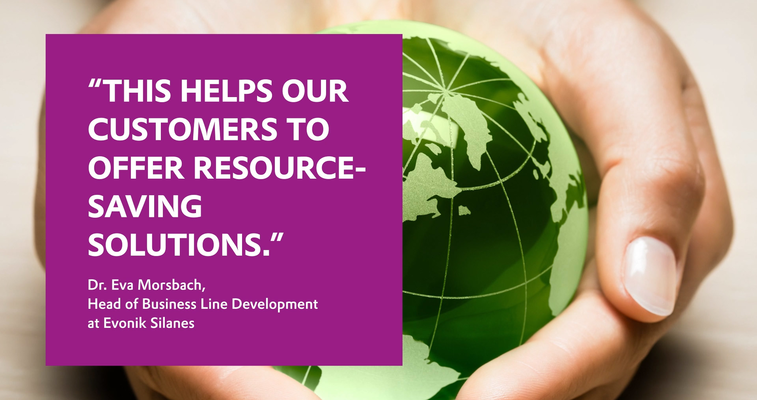
Better instead of more
The chemical industry plays a decisive role in achieving global climate objectives. Evonik sees this as an opportunity and is working on future-oriented solutions for itself and its customers.
Rust never sleeps. It thrives in moist environments, eating its way through bridges, roads and buildings without ever taking a break. When subjected to constant stress, materials such as iron, concrete, glass, limestone or plastic can disintegrate. This has disastrous consequences for the environment, as the products have to be repaired or replaced, entailing considerable use of resources and, in turn, carbon dioxide emissions. This is where the silanes developed by Evonik come into play: They penetrate deep into the materials and provide them with durable protection against possible damage. “Many of our products offer benefits in terms of sustainability,” comments Eva Morsbach, who is responsible for sustainability at Evonik’s Silanes Business Line.
Silanes also contribute to reducing carbon dioxide in the tire industry – their use in green tires reduces greenhouse emissions by five percent compared to conventional tires. In metals processing, silanes reduce water consumption by up to 50 percent compared to conventional phosphatizing processes, while at the same time eliminating the need for chrome, which is considered problematic for the environment.
Water-based silanes also protect humans and the environment – Evonik was the world’s first company to develop such silanes. When used in paints for interior coatings, for example, these help reduce the emissions of volatile organic compounds (VOCs) to a minimum so that it is safe to stay and move about in freshly painted rooms.
Solutions for the green chemistry of the future
To protect the environment, developers at Evonik are constantly searching for better solutions for the green chemistry of the future. “This helps our customers offer resource-saving solutions. By doing so, they can achieve their sustainability objectives and work economically at the same time,” Morsbach explains.
Silanes for building protection, green tires and building materials that do not pose a hazard to health are just three of many examples of the sustainability “handprint” that needs to be maximized: These are the positive effects of the additives from Evonik that enable customers to save energy and materials or manufacture products with a longer service life. In turn, the footprint encompasses all negative environmental influences (emissions, waste) which are generated when producing and transporting a product.
Evonik leads by example
In order to minimize its own ecological footprint, the Evonik Business Line primarily uses bioethanol (in Europe over 80 percent) in the production of its silanes. And the company also relies on sustainable solutions when it comes to power generation: “We mainly use hydroelectric power at our production site in Rheinfelden,” adds Morsbach. “At the Evonik plant in Antwerp, a wind turbine feeds green power into the grid, and there will be more developments in the future.”
The specialty chemicals group also endeavors to continuously improve the efficiency of its production processes. One of the key principles in these efforts involves closed production cycles: “Here, waste generated by one process is used as a raw material for another,” Morsbach explains. This reduces waste, which would otherwise have to be disposed of at considerable cost. Furthermore, the company regularly invests in existing plants to make them even more efficient. For example, Evonik commissioned a new system for steam generation at the Antwerp plant in 2018.
Commitment to health and well-being
Assuming responsibility also means looking after people’s health and well-being. In this context, it is especially important to ensure that all chemicals are handled safely. “We routinely analyze the impact of our activities from an economic, ecological and social perspective,” says sustainability expert Morsbach. Moreover, the company actively participates in the Responsible Care® initiative and is a founding member of the “Together for Sustainability” (TfS) industry initiative which aims to improve the sustainability of the chemical industry’s supply chains. As such, Evonik ensures that it uses clean raw materials and only works with suppliers that also observe strict sustainability requirements.
Evonik is succeeding in its approach of combining commercial success with social justice and ecological compatibility: The EcoVadis rating agency, a TfS partner, awarded Evonik a platinum rating this year. In addition, the Morgan Stanley Capital International (MSCI) rating agency honored the company’s performance in the field of sustainability with an “AA” rating for the first time in 2021. This advances Evonik to the “Leader” category. “This motivates us to continue setting ambitious goals in the area of sustainability in the future and to constantly strive to implement them,” Morsbach emphasizes.


